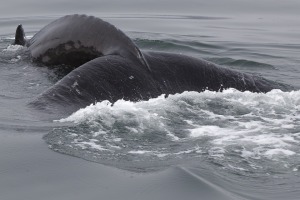
There are moments in life for quiet contemplation. These are moments when we set aside our worldly cares, our tumescent and irritating thoughts, and contemplate the awesome Unknowable of what is in this world. Of all that has ever been, or is, or will be, we in our poor powers of comprehension will only know the minutest fraction of a fraction. We become aware of our limited vision, of our puny pretensions, when we see creatures who have access to realms that are beyond our powers.
Is there any living thing more awesome to contemplate in person than a giant redwood tree, extending its many fingers to the sky?
I had one such reminder of this truth today, and wanted to share it with readers while the feeling was still fresh.
This soliloquy comes from Chapter 70 in Herman Melville’s Moby Dick. The title of the Chapter is The Sphynx. On deck lies the carcass of a captured whale, in the process of being stripped of its blubber. The severed head of the whale has been hoisted against the ship’s side.
Another writer might see nothing of significance here. After all, this is just the stinking remains of a whale. But Melville sees something more. He uses the ordinary, the repulsive, and the insignificant to make grand philosophical statements. This is one of the reasons why Moby-Dick is such supreme literary achievement.
Read this passage aloud to yourself in a quiet moment. It is Ahab’s soliloquy on the whale’s head. The Shakespearean grandeur of the prose is unmatched. It remains for me one of my favorites passages from the book:
Taking a few turns on the quarter-deck, he [Ahab] paused to gaze over the side, then slowly getting into the main-chains he took Stubb’s long spade–still remaining there after the whale’s decapitation–and striking it into the lower part of the half-suspended mass, placed its other end crutch-wise under one arm, and so stood leaning over with eyes attentively fixed on this head.
It was a black and hooded head; and hanging there in the midst of so intense a calm, it seemed the Sphynx’s in the desert. “Speak, thou vast and venerable head,” muttered Ahab, “which, though ungarnished with a beard, yet here and there look hoary with mosses; speak, mighty head, and tell us the secret thing that is in there. Of all divers, thou has dived the deepest. That head upon which the upper sun now gleams, has moved amid this world’s foundations.
Where unrecorded names and navies rust, and untold hopes and anchors rot; where in her murderous hold this frigate earth is ballasted with bones of millions of the drowned; there, in that awful water-land, there was thy most familiar home. Thou has been where bell or diver never went; has slept by many a sailor’s side, where sleepless mothers would give their lives to lay them down.
Thou saw’st the locked lovers when leaping from their flaming ship; heart to heart they sank beneath the exulting wave; true to each other, when heaven seemed false to them. Thou saw’st the murdered mate when tossed by pirates from the midnight deck; for hours he fell into the deeper midnight of the insatiate maw; and his murderers still sailed on unharmed–while swift lightnings shivered the neighboring ship that would have borne a righteous husband to outstretched, longing arms. O head! Thou has seen enough to split the planets and make an infidel of Abraham, and not one syllable is thine.”
Read More: On Duties: A Guide To Conduct, Obligations, And Decision–Making

You must be logged in to post a comment.